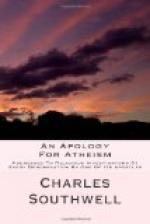Such is the conceit as well as cruelty of men who imagine themselves the vicegerents and avengers of Deity. In His name they burn, and slay, and rob without compunction or remorse; nay, when like Sir Giles Overreach, their ears are pierced by widows cries, and undone orphans wash with tears their thresholds, they only think what ’tis to make themselves acceptable in the sight of God. Believing pious ends justify any means, they glory in conduct the most repugnant to every principle of decency, equity, and humanity.
In the cathedral of Saragossa, is a magnificent tomb, raised, in honor of a famous inquisitor; around it are six pillars, to each of which is chained a Moor preparatory to his being burnt. And if additional evidence were needed of human folly, and stupid disposition, like dray horses to go perpetually, on ‘one’s nose in t’others tail,’ we have it in the astounding fact, that when the Spanish Cortes proposed the abolition of the Inquisition, the populace of Spain considered such proposal, ‘an infringement of their liberties.’ [78:1] We have it on respectable authority, that Torquemada in the space of fourteen years that he wielded the chief inquisitorial powers, robbed, or otherwise persecuted eighty thousand persons, of whom about six thousand were committed to the flames.
Inquisitors made no secret of their hatred towards heretics; to destroy them they considered a sacred duty. Far from ashamed of their cruelty towards heretics, they gloried in it, as undeniable evidence of their enthusiasm in the cause of Christ. Simoncas, one of their most esteemed writers, said, ’the heretics deserve not merely one death, but many deaths; because a single death is the punishment of an ordinary heretic; but these (the heretics) are deserving of punishment without mercy, and particularly the teachers of the Lutheran heresy, who must by no means be spared.’ Pegma, another of their writers, insists, that dogmatical heretics should be punished with death, even though they gave the most unequivocal proof of their repentance.
That eminently pious monarch, Phillip the Second of Spain, so loved to hear heretics groan, that he rarely missed Auto da Fes; at one of which several distinguished persons were to be burnt for heresy; among the rest Don John de Cesa, who while passing by him, said,’ Sire, how can you permit so many unfortunate persons to suffer? How can you be witness of so horrid a sight without shuddering?’ Phillip coolly replied, ’If my son, sir, were suspected of heresy, I should myself hand him over to the Inquisition.’ ‘My detestation,’ continued he, ’of you and your companions is so great, that I would act myself as your executioner, if no other could be found.’




